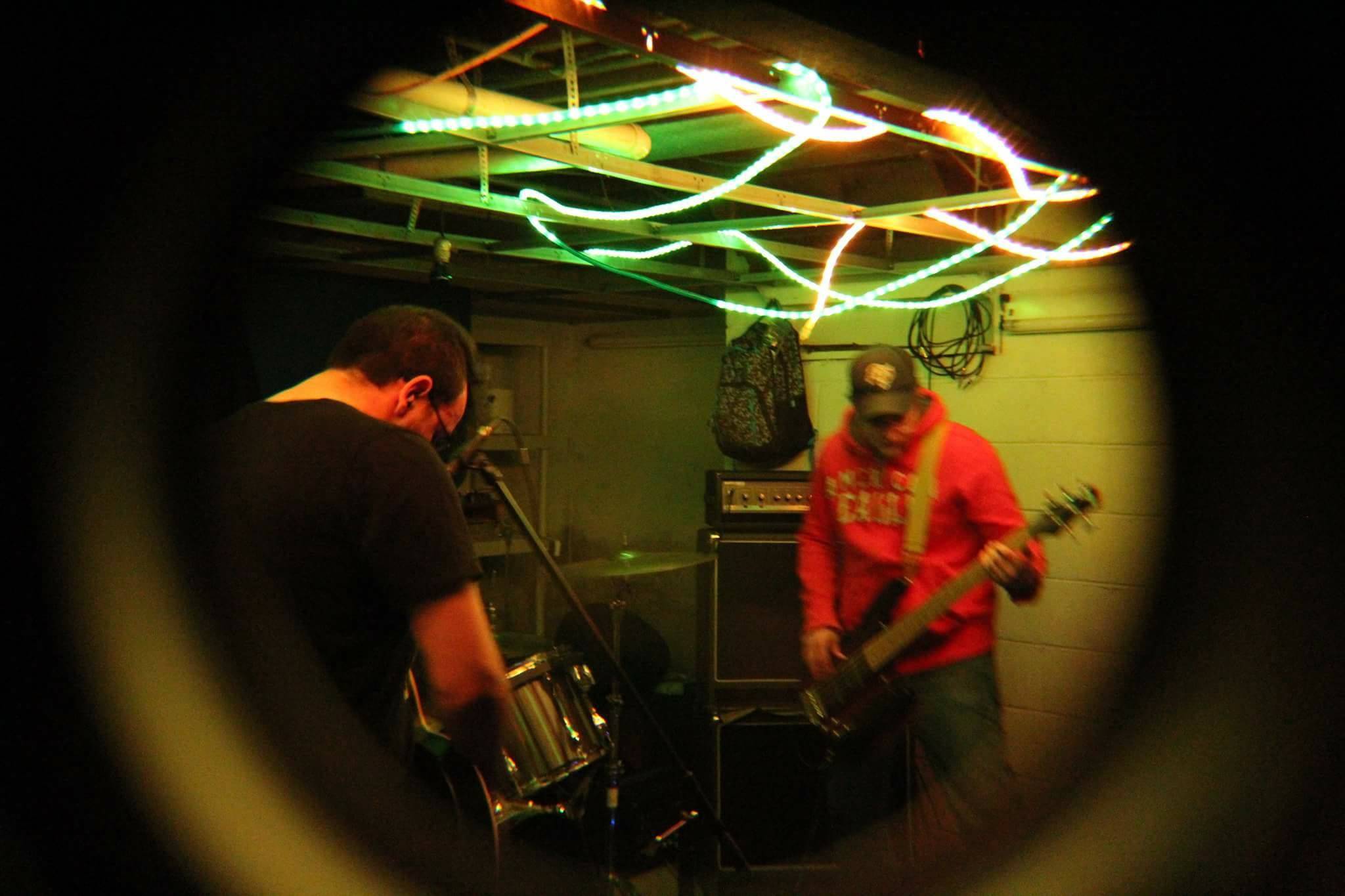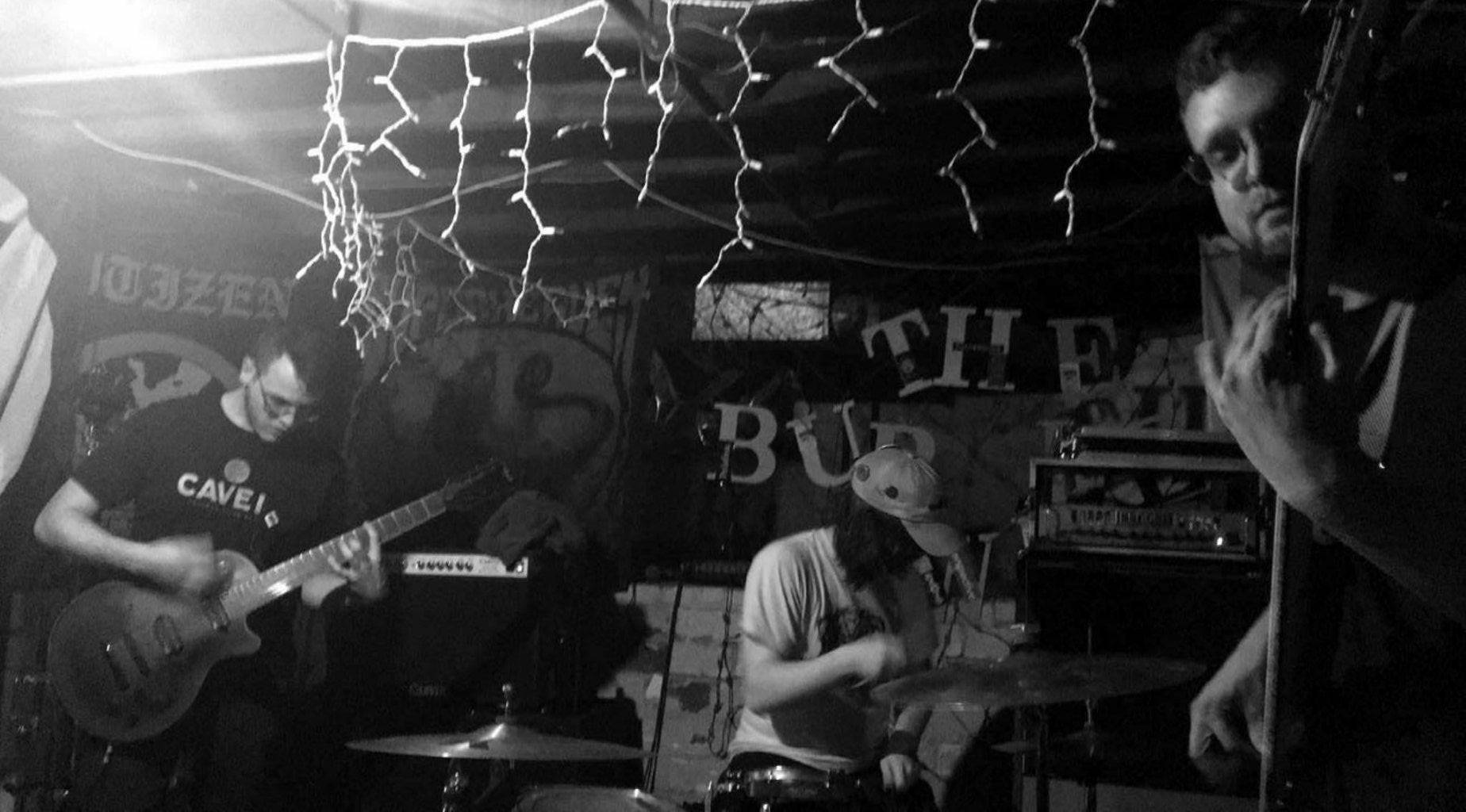Nearly five years after their first EP, local doom metal band Orator is set to release their first full-length album, Breaking The Cycles Of Violence, in early July. Although they have maintained a presence in the music scene, much of their effort over the last year has been devoted to writing, refining, and recording the album, which promises a departure from some of their previous work.
Ahead of their upcoming show at the IMC, singer and guitarist Tyler Day spoke with us about their songwriting process, and how deeply personal experiences shaped their stylistic change.
SP: In contrast to previous Orator records, each song on this record has a full title. What prompted that aesthetic change?
Tyler Day: The first demos were all one big story, so having songs numbered made it feel like a more cohesive whole. It was all supposed to be a concept album, but broken up. With the new record, it’s kind of its own thing. It’s almost like restarting; we’ve got a new member, and I’m writing about completely new things. So it seemed fitting to have a hard break from the stuff on the demos.
SP: You refer to I – III as “demos”; do you consider this to be the first proper Orator album?
Day: I would say the first are maybe more like three EPs. I call them EPs or demos; it’s kind of the same, and I use them interchangeably. This is definitely our first full album, though. It’s only seven tracks, but it’s around an hour long.
SP: Breaking The Cycles Of Violence is a name that carries considerable weight. What significance does it have for you?
Day: It’s a common thread throughout the album, but not something that’s obvious right away. The songs are mostly about different people who manipulate others to get what they want, about being on the receiving end of that continually, and what needs to happen to get out from under that weight. The title track on the record talks a lot about how those people are unbothered by the repercussions of their actions, who they’re using, and the ways they go about satisfying their own needs. It comes back to bite them later because people break out of their control & their character becomes known. Those people hide who they are to sneak in, but they have nothing once others figure it out & break away.. It gets them what they want for a while, but after that, they’re fucked. That’s kind of what I’m focusing on.
SP: The track “Resonate” also has special meaning for you.
Day: I think that one is the best representation of the album, both lyrically and musically. Even though it doesn’t have an eight minute long intro, there are a lot of dynamics to it. It kind of flows somewhere lower & builds back up. But lyrically, it introduces the concept of the manipulator, the person who worked their way into a community while being immoral and using people.
[[mp3 orator_-_resonate]]
SP: It’s interesting that you mention that as being representative of the album, especially considering the length. Most of the songs on the album are over six minutes long, with more emphasis on space and atmospheric elements. That’s something that has grown more and more with each album. What drove you to add more of those elements?
Day: There’s a lot of influence just from the type of music I listen to. I don’t really like verse-chorus song structure in heavy music; I like more of a start-to-finish journey. So sometimes, when I write a song, I’ll have just a riff. Like I’ll have one cool thing & think “that’s cool enough to be a focal point of a song,” and then build the rest of the song around it. So I’ve started with endings & built towards that. Or I’ll have a really cool bridge & think “how can I make this work?” and just kind of go from there. I like to go from part to part instead of repeating things a lot. I think, on this record, we have maybe only two songs that have verses and choruses. The really long songs are us being a jam band for a while, and then when it gets to the really heavy parts, it’s like “here’s three minutes of riff, good luck!”
Some of the stuff I’m writing for the new record is like 25 individual riffs. I showed it to Luke (our bass player) & he said “you’re going to need to record this; I can’t just learn it from watching you play.”

Photo by Ben Voitl
SP: It was also a big surprise to hear acoustic guitars and clean vocals.
Day: I’ve been writing Orator songs for like six or seven years. Since I got a seven-string guitar, the songs I’ve been writing have been Orator songs. When I started playing a seven string, though, I didn’t have any pedals; I had an amp that had one channel. That channel was my guitar sound. When we recorded the first Orator EP, I used that one guitar sound for both the lead and rhythm parts. When we recorded any other guitars other than the main guitars, or any sound effects, any time we felt like we needed to fill space, I wasn’t really able to change my tone to something that had more reverb Instead, we found an air horn or something, and we edited it in. That’s kind of an extreme example; what we actually did was we recorded like an hour of feedback & cut it up. There’s a song on the third EP that’s marked with all these rhythmic stops & it cuts to random feedback from an hour long session of us detuning basses in front of amps & weird shit like that.
So with the new record, it became less about filling the space with whatever and more about doing the coolest and best stuff with what we actually had, because now I have a whole board full of awesome pedals. Luke has his own effects as well, and it doesn’t need anything extra. It’s less weird & more “we’re playing music now.”
SP: The right equipment can be a huge source of inspiration. Has there been anything like that in recording this album?
Day: All of it! My gear really feels like an extension of myself, so over the years, anything that I’ve gotten, at least since I learned about pedals, are things I knew would do specifically this thing I wanted them to do. I bought the Boss RV-500, and since I’ve gotten it, I’ve only added two presets. One is a normal reverb, which sounds good on everything. The other is just a huge long space. I could do a lot more, but I just honed in on these exact things I wanted. I have an Earthquaker Devices Palisades & an Old Blood Noise Endeavors Fault for overdrive. My fuzz is my favorite fuzz in the world, the Old Blood Noise Endeavors Haunt. I just dug in & said “that’s exactly the thing I have an idea for.” I use an Agile 7-string & a Mills Custom 1000-watt bass amp for my guitar. It’s the only amp I use for anything, and I love it. My bass tone & guitar tone are three knob flicks away from each other. At the end of the day, everything I use feels like second nature to me. The record would be something different if I had any other equipment. I do really consider all these effects just as much of an instrument & a part of me.
SP: Beyond just the equipment, have there been any other notable changes in recording this album as opposed to the previous three EPs?
Day: We didn’t have live drums on the EPs. We recorded everything in Logic & programmed the drums ourselves. We used fake drums & fake amps, and we were just fucking around and made it sound cool. By the third EP we got really good at it, but I think having live drums on this puts it head & shoulders above any of that. The live drums are far & away the best part of it. Miles (our drummer) does things on this record that I could just listen to all day, just him playing his parts.
Orator performs this Sunday, May 27th with Marathon and sewingneedle at the IMC.








